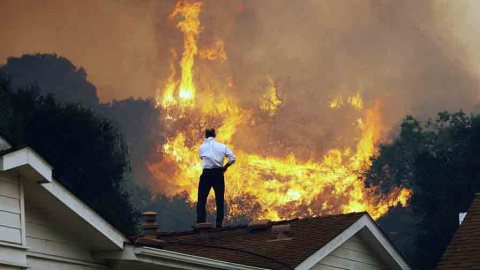The Anthropocene: We’ve Begun a New Era, and It’s Not Looking Good

Genesis 1:26 assures human beings that we’ve dominated the animal kingdom. Mankind was fashioned of divine clay—that deity lords over livestock, fish, whatever else creeps and crawls. This singular sentence has echoed through the ages as scriptural proof that we can be as irresponsible and dangerous an animal as we choose.
The effects are catching up. Like advice from biblical writers, modern man’s planetary assault has had deleterious effects. And the chickens are coming home to roost—literally. Domestic chickens, symbol of factory farming worldwide, are a contender species for the fossil that future geologists will use to determine our current era’s impact.
On Monday at the International Geological Congress in Cape Town, thirty experts voted to dub this epoch Anthropocene; only three said nay, with two sitting it out. The term is derived from Greek: anthropo means ‘human,’ cene ‘new.’ Like in the bible, this coinage denotes man’s influence on the planet, only this time the citation isn’t so cheery. Regardless, it is another indicator of how highly humans think of themselves.
Anthropocene isn’t a new word—geologists have kicked it around since the seventies—but the urgency with which conference experts yelled it is a stark reminder of just how much humans have changed the physical structure of the planet. A few highlights:
The geologists were quick to point out that recognition should spawn optimism. We have the power to change course now, but it requires a serious reconsideration of our lifestyle.
Habit formation is a neurological phenomenon, localized in our brain’s basal ganglia. Journalist Charles Duhigg writes that habits are not destiny. When habits are formed, our brains stop working hard to learn new tasks; it can then focus on other agenda items. He continues,
Unless you deliberately fight a habit—unless you find new routines—the pattern will unfold automatically.
Is this even possible in the most wasteful and consumer-oriented nation on earth? In which one of the two major political parties presents coal as a progressive and necessary resource? In which so many citizens distrust the government to the point that any intervention would instigate the boomerang effect? That is, how could we rewire a culture’s neural circuitry for the betterment of the planet, especially when a sizable percentage of that populace believes we have no impact on climate in the first place?
Add to this our brain’s ability to comprehend the overwhelming data. As John McPhee writes in his geological classic, Annals of the Former World,
The human mind may not have evolved enough to be able to comprehend deep time. It may only be able to measure it.
Extend the above question to nations like China and India, whose energy harvesting and usage has been less than commendable. In the scramble toward economic prosperity it is the earth—atmosphere, resources, livestock—suffering most. Whatever geological experts choose as the fossil marker of the Anthropocene, the underlying hustle of expansive wealth will be the driver, regardless of effect.
Tragic it is that geologists are right: we do have a nearly limitless source of energy, at least for the next four billion years or so. Historian Yuval Noah Harari tells us that all human activities and industries require roughly 500 exajoules of annual energy, an amount the sun offers every ninety minutes. But we’re not focusing on the proper avenues but comfortable habits:
A lot of evidence indicates that we are destroying the foundations of human prosperity in an orgy of reckless consumption.
From fossil fuels to domesticated chickens, the future fossil record is less about bones than manic habitual patterns that moved those bones around the world:
If we accept a mere tenth of what animal-rights activists are claiming, then modern industrial agriculture might well be the greatest crime in history.
From Cambrian to Tertiary, planetary epochs are defined by life’s rise and fall. The Anthropocene is the first era consciously influenced by one of Earth’s creations. Like any rambunctious, ignorant child, we’re aimlessly rebelling for the sake of it, stuck in our ways before the species’ prefrontal cortex has had a chance to develop.
It is fitting that today is also the author Mary Shelley’s birthday. Her great contribution to the annals of literature warns us of the dangers of unchecked ambition. Victor Frankenstein created his Creature in an attempt of birthing beauty, an experiment that turned against him.
After demanding Victor create a wife for him, the Creature ends up murdering Victor’s fiancé, Elizabeth; the same evening Victor’s father dies of grief. Victor gives chase all the way to the North Pole, dying en route. Before perishing, Victor warns the ship’s captain to “avoid ambition.”
The Creature, stowing away on the ship, is tortured by his creator’s death. His raison d’être is gone. The Creature makes his exit floating away on an ice raft into the darkness.
Turning back to today, by the time that ice reaches most of civilization, the water will have warmed considerably, though it will be no less deadly. The Anthropocene needs a raft, soon. Where it travels next depends entirely on our navigational skills. One thing is for certain: we haven’t been steering very well.
—
Derek Beres is working on his new book, Whole Motion: Training Your Brain and Body For Optimal Health (Carrel/Skyhorse, Spring 2017). He is based in Los Angeles. Stay in touch on Facebook and Twitter.




